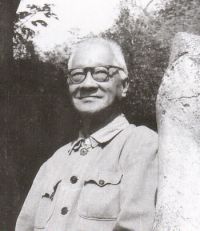Zong Baihua
Zong Baihua (Chinese: 宗白华) (1897-1986) was a prolific writer. His lifelong search for an aesthetic ideal is true of his style as well as his way of life.
Using the penname Zong Zhikui, Zong Baihua was born on December 15, 1897 in Changshu, Jiangsu Province. He studied German language at Qingdao University in 1914. he then transferred to Tongji Gymnasium of German Language in Shanghai where he majored in German literature and philosophy. In 1919, he joined the Young China Society and both helped edit its publication Young China and produced the article “On Views of Life” in the first issue, in which he stresses the philosophy of living on the edge in a vulgar sense of beauty. At the same time, he was commissioned to edit Lamp of Learning, a supplement to News of Current Events. During this period he became close friends with both Guo Moruo and Tian Han, and in 1920 they jointly published A Three-leaf Collection, which mirrors young Chinese people’s inner-most feelings during the May 4th Movement in 1919. A number of poems he wrote during this period were later collected and printed in Little Poems of Floating Clouds (1932). In May 1920, he went to Germany, where he took courses in both aesthetics and philosophy of history at Berlin University. He returned to China in 1925 and taught at Southeast University in Nanjing until 1952, when he was offered a position in the philosophy department at Peking University.
He died on December 20, 1986.
Works
His main works include “Gratitude” (1919), “On Views of Life” (1919), Little Poems of Floating Clouds (1923), “Studies on J. W. von Goethe” (1932), and “Some Important Problems Concerning the History of Chinese Aesthetics” (1980)
Reference
“Poetry and I” (1987)
